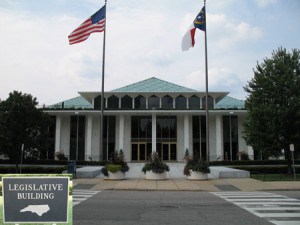I received an e-mail from a very reliable source that told me that S1004 (Level Playing Field Study) will be in the House Public Utilities Committee this Wednesday. Their plan is to refer the study bill to Rules with NO CHANGES. Time Warner Cable and the telecom Lobby want the study bill (S. 1004) to go to Revenue Laws ONLY, and not the Broadband Committee as specified and required in the companion House bill (H. 1252) and advocated by Rep. Faison in the last committee hearing on H 1252.
We must make sure that this bill goes to Broadband Committee as it was publicly voted to do.
I issued this statement to Fiona Morgan from the Independent Weekly this morning on the current developments:
“It has come to my attention from a credible source on the inside that S1004 will be sent to the Revenue Laws Study Committee in the House Public Utilities Committee on Wednesday. It will not go to the Joint Legislative Committee on High Speed Internet in Rural Areas as the Public Utilities Committee had voted to send it to about a month ago. An immense amount of pressure was applied by Time Warner Cable to place S1004 in Revenue Law, as it is a more favorable committee for them to pass this to a full vote. The don’t want a “turf war” on this important issue. They want a free market where they, and only they, are free to monopolize the markets in which they operate. The very definition, from the Revenue Law Study Committee website, of the committee is that “The Committee reviews the State’s revenue laws to determine which laws need clarification, technical amendment, repeal, or other change to make the laws concise, intelligible, easy to administer, and equitable.” This has nothing to do with the State’s revenue laws. It makes sense that it be placed in the Joint Legislative Committee on High Speed Internet in Rural Areas, where the real issues of accessibility, speed and affordability can be addressed. Anything less is a travesty to the citizens to which are legislators are beholden to, and shows that Time Warner and the cable/telecom industry got what they paid for from Sen. Hoyle ($25750 in PAC money) and Rep. Brubaker ($16250 in PAC money).
Municipal broadband is becoming more of a necessity because the current providers refuse to upgrade their infrastructure to technology that is found in this century worldwide. We will continue to fall behind in health care, education and commerce at the speeds at which we move currently. If we want to compete, we must first compete with the high-speeds the rest of the world moves at. Most other developed countries have speeds at least 4 to 5 times the speeds we move at. Japan is at 160Mbps compared to our 10Mbps. South Korea will be at 1Gbps by 2012, 100 times faster. For our state’s very survival, we need someone to step up and upgrade our broadband access and speed. Municipalities are very capable and, more importantly, very willing to provide this step towards the future. All the while, our current providers like to live on their gross profits in the past. “
My first point of contention is that if this is already predetermined, then what is a public committee for anyway. In North Carolina, we did away with back room meetings to decide things of a legislative manner.
My second point is, why is this being sent to Revenue Laws, when clearly it doesn’t even belong there? A committee on Broadband is far more appropriate, if not the only place you could send it! Sen. Hoyle and Rep. Brubaker sit on the Revenue Laws Study Committee, if you catch my drift.
Lastly, North Carolina is 5th highest in unemployment. If we do not give ourselves the tools (and that includes affordable, accessible and up-to-date high speed Internet access), we will continue to head south economically.
Please write the committee members on the House Public Utilities Committee and tell them they should make the Senate concur with the House and send it first to the Broadband Committee and then onto Revenue Laws, the way they originally voted to address this important issue. Tell them we need more accessibility, more affordability and a chance for our state to compete on a global level economically. Let them know that we do not have that right now, due to archaic infrastructure supplied by greedy monopolies and duopolies.
Here are the members’ names and e-mail addresses:
Rep. Lorene Coates <[email protected]>, Rep. Harold J. Brubaker <[email protected]>, Rep. Nelson Cole <[email protected]>, Rep. Bill Faison <[email protected]>, Rep. Russell E. Tucker <[email protected]>, Rep. Kelly Alexander <[email protected]>, Rep. Hugh Blackwell <[email protected]>, Rep. Angela Bryant <[email protected]>, Rep. Becky Carney <[email protected]>, Rep. Beverly M. Earle <[email protected]>, Rep. Bruce Goforth <[email protected]>, Rep. W. Robert Grady <[email protected]>, Rep. Jim Gulley <[email protected]>, Rep. Pricey Harrison <[email protected]>, Rep. Hugh Holliman <[email protected]>, Rep. Julia C. Howard <[email protected]>, Representative Linda Johnson <[email protected]>, Representative Marvin Lucas <[email protected]>, Rep. Daniel McComas <[email protected]>, Rep. Tim Moore <[email protected]>, Rep. Wil Neumann <[email protected]>
A sample letter:
Dear Public Utilities Committee Member,
Please make sure that the study activated by SB1004 (The “Level Playing Field” bill) is in fact level and balanced by mandating that the Joint Legislative Committee on High-Speed Internet in Rural Areas also studies broadband issues in North Carolina AND that the study includes an examination of how the public AND private sector are addressing broadband affordability, accessibility and capacity in North Carolina. Right now SB1004 just has Revenue Laws Study Committee studying what is wrong with municipal broadband ownership and no focus on the private sector broadband deficiencies. There is nothing “level” about that!
Please feel free to elaborate on this letter or write your own, but please write today!


 Subscribe
Subscribe



